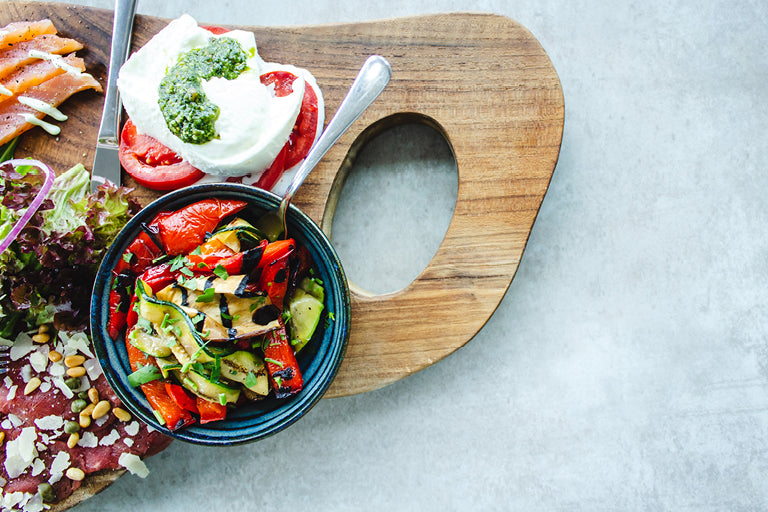A Mediterranean-inspired diet could help balance your hormones, minimise your perimenopause and menopause symptoms, keep your weight down, reduce your belly fat (or so-called meno-belly) and protect your heart and cognitive and bone health.
So much so, in fact, that some experts have even suggested it should be prescribed for overweight menopausal women.[1] So what exactly does it entail, why is it so beneficial and how can you work this way of eating easily into your everyday life?
What exactly is a Mediterranean diet?
Think of the markets around the Med with their abundant selection of fresh colourful produce and foods with proven antioxidant and anti-inflammatory properties like vegetables, fruits, nuts, seeds, olives, herbs, spices and locally caught fish – and this is essentially the basis of a Mediterranean style of eating.
What can you eat on a Mediterranean diet?
This is a largely unrestricted diet that is high in vegetables, fruit, legumes (like chickpeas, lentils and beans) and healthy fats like omega 3 fatty acids from fish, avocadoes, nuts and seeds. Nothing is actively off limits but processed foods or ones that are high in sugar are rarely part of the plan and meat and alcohol tend to be kept to a minimum.
Why the Mediterranean diet is good for your body, mind and soul
In essence, a typical Mediterranean diet includes mostly nutrient-dense, vitamin and mineral packed seasonal produce that is primarily locally-sourced. Mediterranean style meals are also more likely to keep you fuller for longer due to their protein and fibre content. Here is why nutrition is important during menopause. The absence of trans fats (usually found in processed foods and known to raise levels of LDL ‘bad’ cholesterol and lower levels of HDL ‘good’ cholesterol) is what sets the Mediterranean diet apart from many others across the globe.
Mediterranean meals are almost always cooked from scratch – so there are no hidden preservatives, sugar or salt - and they are often blissfully simple with remarkably few key ingredients – think a Greek salad, a Spanish omelette or a classic Italian Margarita pizza or basil pesto– ideally all made using the best and freshest ingredients. Besides making time to cook healthy food, folk in the Mediterranean also usually make time to eat and savour it – meals are generally sociable occasions that involve sitting down to eat with family and/or friends. New research suggests the typical Mediterranean lifestyle – remaining physically active and active in the community - may be just as important as the diet itself. [2]
How is a Mediterranean diet helpful during menopause?
Studies have shown that a Mediterranean style diet can positively impact menopause symptoms. Here are 7 ways switching to a Mediterranean diet could help:
- It minimises many typical menopause symptoms according to a study from 2022 involving overweight postmenopausal women. [3] In fact, it has been shown that the high intake of legumes (like kidney beans, peas, lentils, chickpeas) and extra virgin olive oil on the diet led to less severe, or fewer, menopause symptoms including vasomotor ones like hot flushes and night sweats plus psychological ones, including depression. The women who stuck to the Med diet also reported sleeping better (sleep problems remain one of the most cited side effects of perimenopause and menopause). Legumes are a potent source of vitamins, antioxidants, fibre, protein and also phyto-oestrogens (plant based substances that mimic the role of oestrogen in the body). Extra virgin oil is known to reduce inflammation in the body and there is evidence to show that eating an olive-oil enriched diet for at least three months results in more weight loss than a low fat diet.[4]
- It is an anti-inflammatory diet. An anti-inflammatory diet is particularly important during perimenopause and menopause because oestrogen acts as an anti-inflammatory and diminishing levels of it can trigger inflammation in the body, potentially leading to symptoms like joint pain and possibly even neurodegenerative conditions in later life.[5] Certain foods like ultra-processed ones, refined white carbohydrates, deep-fried foods, processed and cured meats, sugary and very salty ones are known to drive inflammation whereas food staples on a typical Mediterranean diet like fruit and vegetables, fresh fish, nuts, pulses (including chickpeas and lentils), garlic, herbs (like turmeric and rosemary), unsalted nuts and seeds protect against it.
- It can help reduce weight and belly fat. The Mediterranean diet isn’t a weight loss, calorie-counting or restrictive affair but is has been shown to be significant in helping to maintain a healthy weight and given that putting on weight is an issue for many women during perimenopause and menopause there is evidence to show it can help. One study review on overweight and obese people, for example, found that those who ate the Mediterranean way for a year lost more weight than those following a traditional low-fat plan.[6] It may also reduce potentially harmful belly fat – which raises your risk of type 2 diabetes and heart disease. Another study found that those who followed a Mediterranean diet over five years reported less weight gain and abdominal fat than those not following this pattern of eating.[7] Of course, the Med diet is not magic – you still have to watch your portion sizes and the amount of sugar and simple carbohydrates you are eating but it remains one of the healthiest ways to keep your weight under control.
- It increases bone health. Declining levels of oestrogen as you go through perimenopause and menopause put you at an increased risk of reduced bone density and osteoporosis (weakened, fragile bones) [8]. There is evidence to show having a good intake of calcium-rich foods (like natural yogurt, almonds, leafy greens like spinach, oily fish) with vitamin D (synthesised in the body on exposure to sunshine and found in foods like oily fish, eggs, cheese and mushrooms) as part of a Mediterranean pattern of eating can help you to maintain good bone health and reduce the risk of osteoporosis.[9] Vitamin D helps you to better absorb calcium and research also suggests low levels of vitamin D may lead to lower levels of oestrogen.[10] Research shows it may prevent osteoporosis and the risk of fractures by increasing bone density and muscle mass in post-menopausal women.[11]
- It contributes to a healthy heart. This is a diet renowned for its heart-healthy benefits after it was noticed heart disease was not as prevalent in Mediterranean countries as in other Western ones like the US and UK. We also know that the drop in oestrogen during perimenopause and menopause puts women at an increased risk of higher blood pressure, cholesterol levels and cardiovascular disease.[12] One of the key factors in helping keep your heart healthy on a Mediterranean diet is the use of olive oil as the primary source of added fat. Olive oil is a source of monounsaturated fat which helps lower LDL (’bad’) cholesterol levels. Nuts and seeds also contain a complex of essential fats such as omega 3 (particularly walnuts, flax and chia seeds) and omega 6 (pine nuts and sunflower seeds) as well as monosaturated (macadamia and hazelnut) fats. Avocadoes are also known to contain heart-healthy fats and fibre and eating them regularly has also been linked to lower levels of LDL cholesterol and less visceral fat.[13] Omega 3 fatty acids found in oily fish like salmon, mackerel and sardines also help to fight inflammation in the body and are known to help reduce triglycerides (a type of fat found in the blood), the risk of blood clots and lower your risk of stroke and heart failure.
- Better cognitive health. Research published in the journal Alzheimer’s and Dementia suggests eating the Mediterranean way is associated with better cognitive function and may lower the risk of cognitive decline and neurodegenerative conditions like Alzheimer’s dementia.[14] In particular, regularly eating omega 3-rich oily fish as part of this diet is linked to a reduced risk of cognitive impairment. [15] We know that Alzheimer’s dementia disproportionately affects women [16] - and is linked to declining levels of oestrogen during menopause - so anything that can potentially help reduce, prevent or delay that risk should be beneficial.
- Improved mood. The impact of Mediterranean eating on mental health is still being fully investigated but research has shown that people who eat more fruit and vegetables have a lower incidence of depression, better mood and more positive mental health. [17] This is particularly significant during perimenopause and menopause when low mood is cited as one of the most common symptoms of both. More recent research suggests eating in a Mediterranean way helps to generally support mental health generally and may play a role in reducing depression.[18] Here is how dietary changes can help with mood during menopause.
Meal plan for a better menopause
Nutritionist Helen Roach suggests a range of delicious breakfasts, lunches, dinners, snacks and (occasional) sweet recipes inspired from around the Med. Also note that lunch and dinner portions can be adjusted and served interchangeably.
Breakfast
- Mediterranean granola – with added olive oil, this Mediterranean breakfast packs a healthy punch
- Spanish omelette – a hearty dish made with eggs, potatoes and onions. I like these traditional versions of the recipe; Recipe 1 Recipe 2
- Greek yoghurt, berries & nuts – use 3 tbsps of full fat Greek yoghurt (for higher protein content) and top with a handful of nuts and berries
- Oats, apple & chia – half a cup of oats with one chopped (medium) apple and a sprinkling of chia seeds.
- Tomato & spring onion toast – one slice of seeded sourdough toast with half a large sliced vine-ripened tomato and one spring onion drizzled in olive oil with a little salt to season.
- Blueberry millet bowl – an alternative to oats, millet is a good source of protein and minerals that should keep you feeling satisfied throughout the morning. I love this recipe.
- Feta & watermelon – serve 30g of feta with 100g of watermelon (roughly a 1 inch thick wedge)
Lunches
- Salmon and eggs: Scramble 2 medium sized eggs with olive oil and seasoning and add to a bowl of smoked salmon strips (60g). Add half a chopped avocado to serve.
- Spanish Chicken with Bravas sauce: this is a simple one-pot dish with a rich flavour. Chicken thighs are rubbed with a pinch or two of salt and paprika and browned in the oven. The sauce is made using half a cup of water, 1 tablespoon of red wine vinegar, a can of tinned tomatoes, a dash of olive oil, 1 diced onion, 3 crushed garlic cloves, 1 can of butter beans and a handful of mixed olives. Add these to the browned chicken and cook for a further 30 minutes at 180˚C. Serve one chicken thigh per person and sauce with a light salad for lunch or with rice as a dinner option.
- Gazpacho: Put tomatoes, green pepper, onion, garlic, olive oil, sherry or red wine vinegar, salt and black pepper into a blender, whizz into a smooth liquid and place in the fridge to cool. Gazpacho often traditionally contains breadcrumbs but I’ve left the bread out of this recipe to reduce the simple carb content.
- Lemon broccoli salad with pine nuts: Mix a handful of broccoli, 2 spring onions, a handful of cranberries, a handful of pine nuts into a salad bowl and add a tahini dressing (made with 4 tablespoons of tahini, 1-2 tablespoons of extra virgin olive oil, the juice of 1 medium lemon, a pinch of salt)
- Lentil soup: Sauté ½ an onion, 1 clove of garlic and 1 carrot extra virgin olive oil until tender. Add a teaspoon each of oregano, cumin and rosemary, 1 bay leaf and a pinch of red chili pepper. For the broth use 2 cups of low-sodium vegan broth as the liquid base here (you can use chicken broth if you prefer). Add 1 cup of lentils to the broth in the last 20 minutes of cooking. Add vegetables, herbs and lentils together with the broth. Season with lemon zest and juice to finish and top with parsley to garnish.
- Chickpea salad with avocado: Slice or dice tomatoes, olives, avocado and add chickpeas (drained), cucumber (diced) & onion (diced) to a bowl. Make a dressing using extra virgin olive oil, fresh chopped parsley, salt and pepper and lemon juice.
- Spinach pie: Use ready rolled filo pastry (270g) – you can find this in most supermarkets and it is also available in gluten free options. For the filling you will need 1 small red onion diced, one clove of garlic, crushed, 250g of chopped spinach, grated nutmeg (pinch) 100g of feta cheese, 1 beaten egg, 1 tbsp of fresh dill and salt and pepper. Brush butter or olive oil onto the filo pastry sheets. Heat oven to 200C and sauté the onions & garlic. Add the spinach and bring off heat when cooked. Cool then add nutmeg, eggs, feta and season into a bowl and mix. Place 4/5 filo sheets to create the base of the pie then add the filling mix and cover with 4/5 filo sheets. Drizzle with olive oil or butter before placing in the oven for 30 minutes or until golden brown. Cool and serve.
Dinners
-
Spanish Tapas: A great way to pack in the nutrients with a variety of vegetables, seafood, fish and meat (optional) served in small plates. I recommend the following:
- Olives – stuffed with garlic and peppers
- Squid
- Garlic & chili prawns
- Grilled lemon artichokes
- Feta & orange/quince
- Grilled aubergine with garlic oil and onion
- Patatas bravas/alioli (potatoes cooked in a tomato and paprika sauce served with garlic mayonnaise)
- Goats cheese stuffed tomatoes with paprika & capers
- Melon & ham
- Tomato & chorizo
- Italian-style veggie pizza: Traditional Italian pizzas contain very few ingredients and toppings. Tomato sauce, pecorino cheese, fresh basil leaves, black pepper, olive oil and mushrooms are really all you need to create an authentic Italian pizza experience. Many supermarkets sell fresh pizza dough in the refrigerator section or you can buy ready-made pizza bases. Dough could be sourdough, gluten free or standard wheat but aim for a thin crust, Italian-style to minimise having too many simple carbohydrates. Pizza can be shared or frozen and even keeps well in the fridge for a day if you have made too much. To maximise the nutrient density and overall macronutrient balance of this dish, aim for a thin crust and pile high with veggies and herbs. Aim for a small to medium portion as your main meal and use wholegrain & sourdough varieties of flour or dough.
- Vegetable rice-pasta bake: You will need: Onion, garlic, courgettes, tomatoes, passata, aubergine, olive oil, rice pasta (a gluten free alternative to wheat pasta), pesto and mozzarella. Chop & bake vegetables in the oven at 200C for 20-30 minutes. Boil the pasta and drain. Mix both together in the baking dish and top with pesto and mozzarella then return to the oven for 5-10 minutes.
- Crab & bacon stuffed mushrooms: You will need: Gruyere cheese, bacon, lump crab meat, portobello mushroom, sweet red pepper. Pre-cook the pepper – flash fry or bake beforehand. Mix everything together (except the mushrooms) and then fill a large mushroom with the mix. Pop in the oven for 15 minutes to bake the mushroom and allow then to meld together.
- Portuguese Bacalhau a bras: Cod pieces, chipped potatoes, tomatoes, eggs, onions, olives, olive oil, parsley, garlic, salt & pepper to taste. Cover the bottom of a wide saucepan with sliced tomatoes, garlic and onions. Cook until golden and then add cut up pieces of cod fish and drizzle with good quality extra virgin olive oil. Let everything cook for about 20 minutes on a medium heat. Once everything has cooked, add in already cooked chipped potatoes and stir for a few minutes. Add in lightly beaten eggs with salt and pepper to taste. Stir everything together keeping the eggs soft and creamy. Add a few olives, grated cheese (optional) and garnish with parsley. Drizzle a little more olive oil before serving (optional). Transfer to a plate and serve hot. For step by step instructions we like this traditional recipe: https://portugueserecipes.ca/recipe/82/1/Portuguese-Bacalhau-à-Bras
- Mediterranean Roast Beef Dinner - Lamb is the typical Mediterranean roast but has the highest CO2 emissions. So we would suggest beef is a better option in this respect. Pork is better still but nutritionally not quite as good as beef. Rub 1.5 kg silverside beef with olive oil, salt & pepper and bake in in the oven until browned. Add onions (chopped) and return to oven to bake for a further 20 minutes. Remove and add courgettes (sliced or diced), tomatoes, aubergine (sliced), yellow peppers (halved or quartered) to the dish and bake for a further 40 minutes. Remove and drizzle with olive oil, balsamic vinegar, tarragon & basil leaves top serve (you can also add capers for an authentic finish).
- French Leek Tart (Flamiche Aux Poireaux) This traditional dish is filled with leeks, onions, cheese and eggs to provide good sources of protein, vitamins A, C & K as well as minerals such as potassium iron and manganese. Typically made with short crust pastry, you could use the gluten free options readily available in many grocery stores. The French typically tend to add bacon to this recipe but I have kept it vegetarian. Chop 1 leek and 2 onions into small pieces and stir fry for 10 mins. Place pastry in a baking pan. Mix 2 eggs, 100ml cream (or alternative), 200ml nut or soy milk, 80mg of butter in mixing bowl and 15 ml of olive oil. Add seasoning: salt, cayenne and nutmeg are typically used. Place pastry in the bottom of baking tray/dish to produce a crust-free tart. Bake for 40 minutes at 220 C.
Snacks/Desserts
- Figs & feta – 1 medium fig with 20 mg feta
- Tomato & cucumber with olive oil – sliced medium tomato with sliced cucumber drizzled in olive oil & salt to taste
- Cinnamon banana – one medium banana sprinkled in cinnamon
- Hummus dip – dip with cucumber/carrot/radish/sweet peppers
- Baked courgette chips – 1 baked courgette (cut into thin slices) with yoghurt dip
- Coconut and Pomegranate – 2 tbsps. diced coconut with handful of pomegranate seeds
- Honey herb walnuts – 5 walnuts roasted in honey & rosemary
A note about portion sizes and calories
As a general rule, aim for small portion sizes for breakfast and lunch with medium portion sizes for dinner. This can be switched up if you eat more at lunch than dinner. Read more about portion sizes for women from the Association of UK Dietitians and BUPA.
The Mediterranean diet is not about calorie counting or having ‘treat’ or ‘cheat’ days – it is a balanced way of eating that is low in sugar and high in nutrients. Ideally it should be a template for life and evidence shows it is especially beneficial as you head into perimenopause and menopause as it helps minimise many symptoms, manage your weight, reduce inflammation in the body and your risk of many chronic diseases. If you get the basics right by eating plenty of vitamin-packed and water-rich fruit and veg and some protein sources with legumes and pulses, for example, you will find it difficult to overeat as these foods are filling.
It is also important to remember that not all calories behave equally once in our body. Calories from sugar or simple carbohydrates like white processed bread, white rice or shop-bought pastries will have a very different physiological and biochemical impact on our health than the same amount of calories from fat or protein. The calories from simple carbohydrates or sugar, for example, will encourage your body to enter and remain in ‘fat storage mode’ (particularly around your middle) [link to Is menopause weight gain inevitable: how to minimise your meno belly] as they cause insulin spikes. This can not only lead to weight gain but also potentially hormone imbalance. Eating healthier fats and protein like those typically consumed on a Mediterranean diet, say salmon and avocado or Greek yogurt with berries and nuts, are foods that can help balance blood sugar. Research shows eating more healthy fats, proteins, fibre and fruit and veg can help menopausal women stave off weight gain, improve their gut microbiome [link to 10 Top Tips for Good Gut Health], reduce inflammation in the body and cut the risk of heart disease and diabetes.[19]
Suggested 7 Day Meal Plan to help tackle menobelly
This offers two vegetarian days, two oily fish days, one seafood day, one red meat day & one poultry day.
Monday
- Breakfast Spanish omlette
- Lunch Chickpea salad with avocado
- Dinner Italian-style veggie pizza
- Snack Figs & feta
Tuesday
- Breakfast Greek yoghurt, berries & nuts
- Lunch Salmon & eggs
- Dinner Vegetable rice-pasta bake
- Snack Tomato & cucumber with oil dressing
Wednesday
- Breakfast Oats, apple and chia
- Lunch Lemon broccoli salad with pine nuts
- Dinner Crab & bacon stuffed mushrooms
- Snack Cinnamon banana
Thursday
- Breakfast Tomato & spring onion toast
- Lunch Spanish chicken with bravos sauce
- Dinner French leek tart
- Snack Hummus dip
Friday
- Breakfast Blueberry millet bowl
- Lunch Gazpacho
- Dinner Portuguese bacalhau a bras
- Snack Baked courgette chips
Saturday
- Breakfast Feta and watermelon
- Lunch Lentil soup
- Dinner Spanish tapas (Optional veg)
- Snack Coconut & pomegranate
Sunday
- Breakfast Mediterranean granola
- Lunch Spinach pie
- Dinner Mediterranean beef roast
- Snack Honey herb walnuts
Sources and references
[1] https://pubmed.ncbi.nlm.nih.gov/32329636/
[2] https://www.abstractsonline.com/pp8/?_ga=2.113113345.481834018.1677504287-1357375536.1667480843#!/10825/presentation/200
[3] https://www.frontiersin.org/articles/10.3389/fendo.2022.886824/full
[4] https://pubmed.ncbi.nlm.nih.gov/20545561/
[5] https://jneuroinflammation.biomedcentral.com/articles/10.1186/s12974-020-01998-9#:~:text=Conclusion,drives a systemic inflammatory state.
[6] https://www.amjmed.com/article/S0002-9343(15)30027-9/fulltext
[7] https://www.ncbi.nlm.nih.gov/pmc/articles/PMC5916888/
[8] https://www.nhs.uk/conditions/osteoporosis/
[9] https://www.ncbi.nlm.nih.gov/pmc/articles/PMC7915719/#:~:text=In this context, the MD,and maintaining good bone health.
[10] https://www.medicalnewstoday.com/articles/325465#:~:text=Study results,have higher levels of estradiol.
[11] https://www.endocrine.org/news-and-advocacy/news-room/2018/mediterranean-diet-is-linked-to-higher-muscle-mass-bone-density-after-menopause
[12] https://www.bhf.org.uk/informationsupport/support/women-with-a-heart-condition/menopause-and-heart-disease
[13] https://www.ahajournals.org/doi/10.1161/JAHA.122.025657#d24987067e1
[14] https://alz-journals.onlinelibrary.wiley.com/doi/10.1002/alz.12077
[15] https://www.mdpi.com/2072-6643/14/12/2408
[16] https://www.alzheimers.org.uk/blog/why-dementia-different-women
[17] https://www.ncbi.nlm.nih.gov/pmc/articles/PMC7019743/
[18] https://www.ncbi.nlm.nih.gov/pmc/articles/PMC7536728/
[19] https://joinzoe.com/learn/menopause-metabolism-study



